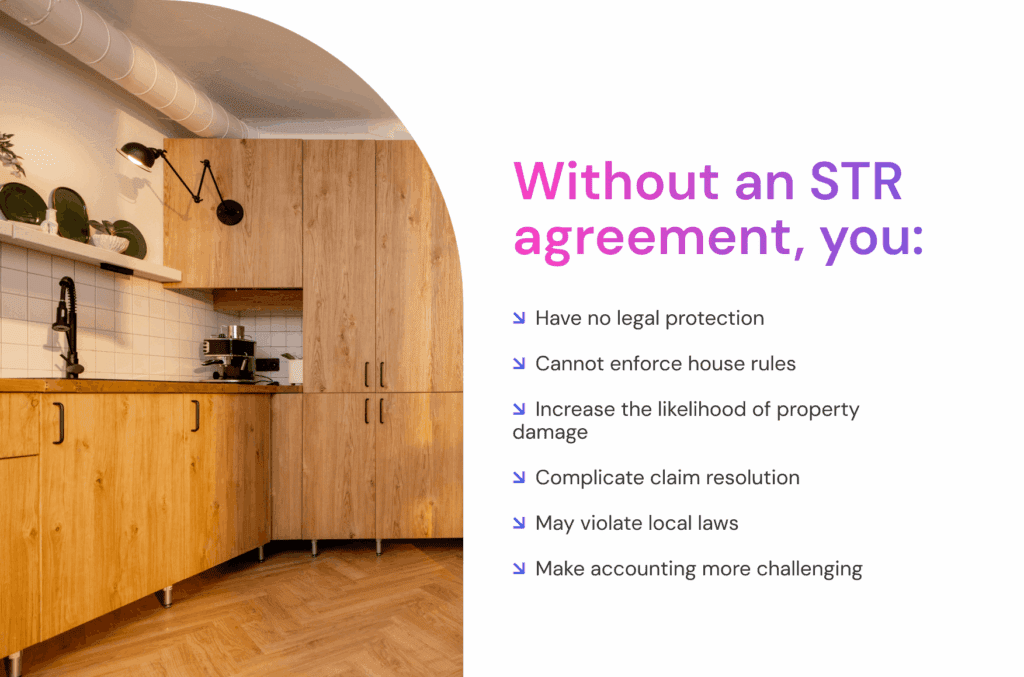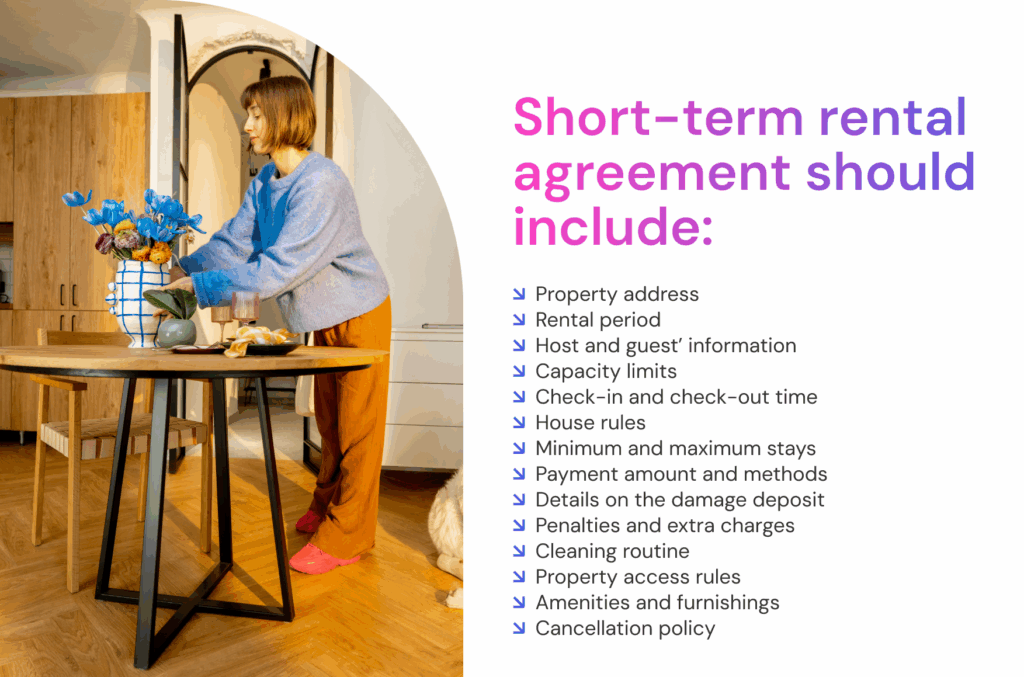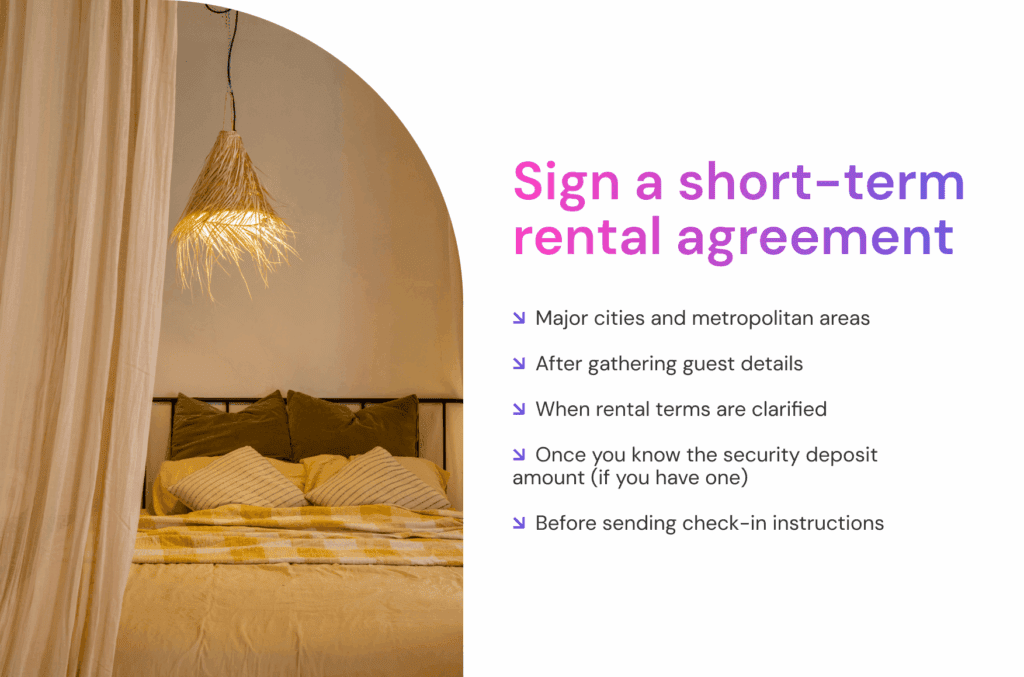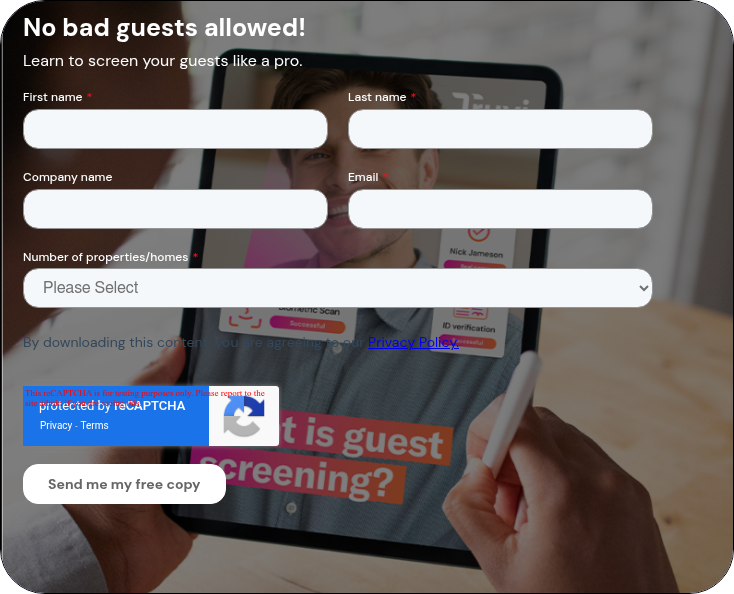It may seem like signing a short-term rental agreement is too serious and causes unnecessary strain. But it’s worth it. An official document makes you better protected when anything goes wrong. Whether you face financial fraud or suffer from property damage, a rental agreement gives a straightforward way to fix it. Especially when you run direct bookings and have no backup from OTAs.
This article will guide you on what to include in a short-term rental agreement. You will also find a template you can customize to match your rental terms and local legal requirements.
What is a short-term rental agreement?
A short-term rental agreement (also a vacation rental agreement) is a document signed between a property owner/manager and guests. It includes rental terms and responsibilities of both parties and covers the period of short-term rentals (1 to 30 days). The agreement describes vacation rental property with all valuables, maximum occupancy, rental rules and penalties, cleaning policy, and other critical details.
The agreement brings order and clarity. It protects both the host and guests from dishonest behavior and not meeting their promises. For example, guests can request to provide amenities listed in the agreement but missing in an apartment. Or the host can make guests pay for broken furniture based on penalties.
When should you sign an STR agreement?
A short-term rental agreement is a must-have for direct bookings. When you rent through platforms like Airbnb, guests automatically accept rental terms, which doesn’t happen with direct rentals. That’s why you need an agreement to cover the gap.
You can also use an STR agreement for other types of short-term rentals to have an official document specifying rental rules. There are many easy-to-use online tools for document signing and storage, such as PandaDoc, DocuSign, and SignNow.
Why do you need a short-term rental agreement?
A short-term rental agreement complicates the booking process. Guests are forced to read the terms (or pretend they do) and commit to being nice and following the rules. Some may not like it, but most people understand that it also protects their rights. This and other benefits of a short-term rental agreement are convincing enough to make you use it:

Protect your property
House rules inform guests what they can and cannot do but are not legally binding. Bad guests may still throw a party or break your washing machine without consequences. You must have a rental agreement to minimize such cases or at least make guests pay. The official document makes people feel responsible and helps you protect an apartment from guest damage. It’s a nice addition to short-term rental insurance that protects hosts.
Set rules and expectations
An STR agreement allows you to avoid misunderstandings. When people claim you owe them something, and you actually don’t, you can always turn to the agreement and show them what they have agreed to. Maybe they expect more frequent cleaning, homemade meals, or a bottle of wine waiting for their arrival. Not in your terms of rentals? Then, you don’t have to provide anything.
Collect payments smoothly and prevent disputes
Since an agreement directly states all payments and the cost of extra services, you are more likely to get paid without issues. You can specify additional charges for late check-outs that disrupt your cleaning schedule and affect the next guests. People hate to pay more, so it’s better to draw the line in writing. It reduces the risk of disputes and helps you resolve them in your favor if they happen.
Create trust and look professional
Guests are no less interested in a comfortable and trouble-free stay than hosts and property managers. You build trust by offering them an agreement that protects their rights and offers fair terms. It improves your brand image and helps you get repetitive bookings from loyal clients.
Repel bad guests
Worried that asking guests to sign an agreement can make them leave? It may happen, but mostly with bad guests or fraudsters trying to scam you. Sometimes, people not staying at your property is good news. With a proper short-term rental agreement, you will host guests who take charge of their actions and follow the rules.
What if you don’t have a short-term rental agreement?
A short-term rental agreement is not mandatory. So, the choice of whether to have a short-term rental agreement or not is yours. Yet, you must understand the potential consequences of not signing it.
First, you have no legal protection. You cannot do much without an agreement in case of property damage, cancellation, or guest overstaying. Besides, making guests follow the house rules without an agreement may be hard. People feel less obliged to obey the requirements that are not official.
Things to add to your short-term rental agreement
There are certain things a decent short-term rental agreement must have. It makes it legally binding and turns a piece of paper into a reliable way to manage guest-host relationships. Below are the main clauses and details to add to your STR agreement.

Property address
Add brief information about the property at the top of the agreement, including its address, number of rooms, and current condition. Mention a swimming pool, garden, and other areas guests can access.
Rental period
Specify the rental period, indicating when it starts and ends. Note that with short-term rentals, you cannot exceed 30 days. Rentals over 30 days are considered mid-term and fall under different laws.
Host and guest’ information
Include the details that identify both the host and the guest. This information is required to make the agreement legal and have the necessary personal information in case of disputes and misunderstandings.
You must include:
- First and last name
- ID, passport, or driver’s license
- Home or permanent address
- Phone number and email
Capacity limits
Limit the number of guests who can stay in your property based on your personal preferences and local law. Many cities (e.g., New York and San Francisco) have regulations specifying the maximum number of guests per unit. If you break these laws, you are the one who will pay fines. Setting capacity limitations also allows you to avoid parties and unsolicited guests.
Check-in and check-out time
Mention when guests are allowed to check in and out. Specify the timezone to avoid confusion and people coming to your property too early. It will help you avoid overlaps when new people come before the previous ones leave or you clean the place.
House rules
Have a separate section for your house rules, listing what is allowed and forbidden. You should include information on quiet hours, use of amenities, and check-out cleaning expectations, like taking out trash after leaving the property. Most property owners also prohibit parties and photoshoots without written permission. Personalize the rules based on your preferences and generally accepted standards. If you don’t mind hosting someone with pets, great! But if you do, be sure to add this to the agreement.
Minimum and maximum nights booked
If you have any preferences on the duration of stay, include them in the short-term rental agreement. Many hosts set the minimum to two nights to cover the expenses of cleaning and preparing a property for the next guests.
Payment amount and methods
Make the final amount clear in the rental agreement. You can also indicate credit card surcharges if you know they apply to avoid disappointing renters at the check-out. Also, list supported payment methods to inform guests what they can choose from and avoid payment issues.
Details on the damage deposit
Specify the terms of damage deposit collection and return if you gather deposits. You must assure guests they will receive their money back after leaving the property clean and intact. Indicate the amount guests need to pay and the number of days it takes to refund it.
Penalties and extra charges
If you expect guests to pay for the damage they cause, say it to their face. List the type and severity of damage with potential charges in the agreement. You should also list any extra services offered in your property with prices. Whether you have a paid gym, airport transfer, or anything else, add it to the terms.
Cleaning routine
Mention how often you clean the property and what is included in the cleaning fee. If you expect any cleaning from guests before the check-out, indicate it in the short-term rental agreement.
Host and guest’s access to property
Inform guests about the type of access they will have and under what conditions you can enter the property during their stay. Emergencies happen, and you may need to access the place while guests are still there. A 24-hour notice is an industry standard.
Amenities and furnishings
List what is included in the rental property in case anything goes missing. Be specific about furnishings, kitchen amenities, bathroom essentials, devices, etc.
Alternatively, you can attach a separate sheet listing the property’s inventory and furnishing to an agreement to make it more concise and convenient.
Cancellation policy
Guests will cancel their bookings, and you must know how to handle it. That’s why it’s better to clarify the cancellation terms in advance. You can charge guests the full amount if they cancel less than 24 hours before the reservation and return the payment fully or partially for early cancellation.
Note. We recommend consulting with a local legal professional to understand what information is mandatory in your area. Short-term regulations differ, and you may need to include other critical details in your short-term rental agreement.
Take a look at reviews of the top PMS solutions like Bookster, Hostfully, Hospitable, and Lodgify.
Short-term rental agreement template
It’s a basic template that provides the foundation to design and customize a short-term rental agreement. You can add the clauses from the previous section or any other terms. Feel free to copy the template and use it for guidance.
Short-term rental agreement
This Short-Term Rental Agreement (“Agreement”) is made on (enter the date), by and between:
Landlord (Property Owner/Manager):
Name: __________________________
Phone: _________________________
Email: _________________________
Guest (Renter):
Name: __________________________
Phone: _________________________
Email: _________________________
The Landlord and the guest are referred to as Party/Parties in this Agreement as necessary. With this Agreement, the Landlord agrees to provide the Property located at _________________________ (enter property address) under the following terms.
Property Information
The Property is _________________________ (enter brief property description, e.g., a three-bedroom apartment with a balcony). At the moment of signing this Agreement, the Property is furnished with **_________________________ (enter furnishing and amenities).
Rental Period
For the duration of the rental period from _______ to________, the Renter may use the Property, following the terms of rentals. The Landlord must provide the Guest access to the Property on the first day of the rental period before or at _______ (enter the check-in time). The guest agrees to return the property access means before or at _______ (enter the check-out time) and leave the Property. Both parties can discuss the changes in check-in and check-out time in writing.
Maximum Occupancy
The maximum number of guests who can stay in the rental Property is _________ (enter the number) according to the local law and terms of rentals. If the guest allows other people to enter the Property without receiving prior consent from the Landlord, penalties may apply.
Terms of Rentals
After checking into the property, the guest must follow the listed rules and prohibitions. Guests are NOT allowed to:
- Modify or change the structure of the Property in any way
- Make noise after 10 PM
- ________________ (enter other terms for your property)
Amount
The Guest must pay ________________ (enter the amount and currency) to the landlord in full due on ________________ (enter the date) through the following payment methods ________________ (enter the supported and lawful payment methods).
Signatures
Landlord:
Guest:
Other ways to maximize property protection
An STR agreement makes short-term rentals safer and more predictable. Both parties know what to expect from each other and their responsibilities. Combined with additional tools like property insurance and guest screening, a good STR agreement can shield property managers and owners from most issues. You won’t even need to have disputes with guests.
Property insurance or damage protection covers your back in case of accidental and malicious damage or force majeure events. You have someone to quickly reimburse your expenses without long and tiring disputes. Guest screening is a powerful addition to damage protection services. You check guests before accepting their booking requests, which is particularly important with direct rentals when you have no client reviews.
Truvi is a unique platform combining guest screening and damage protection services. We screen your potential guests and inform you about any risks while offering up to $5,000,000 coverage in damages. All in one tool. Get a demo now to test how it works and strengthen your property protection.
Important Disclaimer: The content of this blog post is for informational purposes only and does not constitute legal advice. We strongly recommend seeking professional legal counsel for any specific legal questions or before making any decisions based on the information provided here. Truvi makes no representations or warranties regarding the accuracy, completeness, or suitability of the information and will not be liable for any loss, damage, or legal consequences arising from its use.











